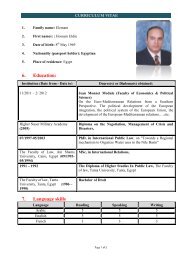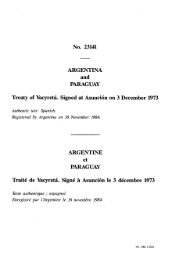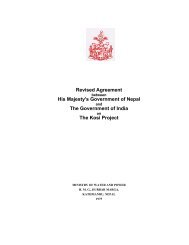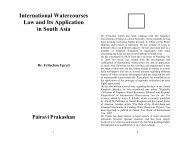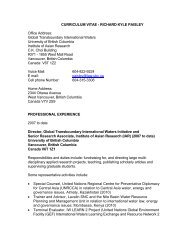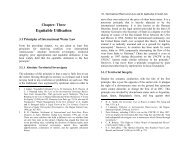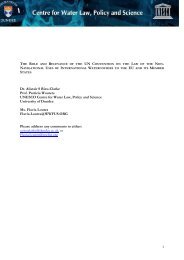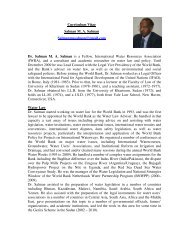Upreti, Trilochan, International Watercourses Law and Its Application ...
Upreti, Trilochan, International Watercourses Law and Its Application ...
Upreti, Trilochan, International Watercourses Law and Its Application ...
You also want an ePaper? Increase the reach of your titles
YUMPU automatically turns print PDFs into web optimized ePapers that Google loves.
Legality River Linking Project / 271 272 / <strong>International</strong> <strong>Watercourses</strong> <strong>Law</strong> <strong>and</strong> <strong>Its</strong> <strong>Application</strong> in South Asiasay, consent <strong>and</strong> cooperation from the view of regionalcooperation is requires. The historical conflicts on the sharingof Ganges river water, which was thought to be resolved afterthe treaty of 1996, could not even been complied due to theextraordinary reduction of the predicted flow <strong>and</strong> the treatymechanism was unable to fulfil India's obligation on thatminimum flow guaranty clause of the said treaty. Worse still,India has diverted the waters of Teesta unilaterally withoutgiving attention on Bangladesh legitimate share, has beenadded the fuel on already complex <strong>and</strong> conflicting relationsbetween two neighbours. From the point of Bangladesh, theyhave been restricted from their legitimate entitlement in theGanges <strong>and</strong> as a result, Bangladesh's one third of fertileterritory have been converted into a desert l<strong>and</strong>. Moreover, Shehas been maintaining that India's paln to divert waters ofBrahumputra, from which her almost all territory will beconverted into desert as a result her existence would bejeopardised. In a nutshell, Bangladesh has considered that theproject could be threat to her very right to exist as a nation. Ifone consider the magnitude of this question, it is very unlikelythat India could make her agree to commission this project untilshe rectified the past grievances <strong>and</strong> accommodate her everyinterests. 23 On the other h<strong>and</strong>, it seems that without thisundertaking, India's problem of relieving from poverty <strong>and</strong>socio-economic development is not possible, which means sheis determined to implement this project. In this potentialeventuality, one can assume that cooperation from regionalperspective is the need of hour in which every nation can get itsfair share, divergent views should change into convergence. Inorder to create this environment may take long time along withthe completion of such huge, complex areas of studies,verification <strong>and</strong> crosscheck into them by the experts ofinternational repute could consume substantial period of time.23 M. Asfuddowalah, "Sharing Transboundary Rivers: The GangesTragedy" M. I. Glassner(ed), The United Nations at Work, WestportCT: Praeger, 1998, pp. 212-218.The success of Indus River Waters Treaty 1960 <strong>and</strong> itseffective implementation even in two wars time has beenregarded as a catalytic. 24 However, there are also disputesrecently emerging <strong>and</strong> it is interesting matter how India <strong>and</strong>Pakistan strive to resolve the issues. Pakistan has beenobjecting the construction of Bahlihar hydroelectric projectmaintaining that it is against the provision of the said treatywhilst India is ascertaining it does not hamper existing uses orreduce the volume of the waters. Other objections of Pakistanare with India's plan to divert Chenab river water in HimanchalPradesh at Basholi-Pathankot dam project, the Wullar barrageproject on Jhelum, the Dul-Hasti hydroelectric project atChenab <strong>and</strong> the Sawlko dam at the same river. It is interestingfact that the Legislature of Jammu <strong>and</strong> Kashmir has asked thecentre to repudiate the Indus treaty <strong>and</strong> give her free h<strong>and</strong> todevelop project in this state. However, this proposal wasrefused by the central Government. It is understood that theJoint River commission under the treaty, which did not cease tosuccessfully working in the time of wars 25 <strong>and</strong> bothgovernments are working expeditiously to resolve thesedisputes. It is obvious that India appears to be seriouslyworking to find out resolution with any water disputes withPakistan <strong>and</strong> reverse the position whilst dealing withBangladesh <strong>and</strong> Nepal. That is to say, undermine the legitimatedem<strong>and</strong> of these neighbours. This has been proved in severalprojects implementation <strong>and</strong> water conflicts with these nations.How this is happening could be topic of separate politicalresearch.24 G. T. Keith Pitman, "The Role of the World Bank in EnhancingCooperation <strong>and</strong> Resolving Conflict on <strong>International</strong> <strong>Watercourses</strong>: thecase of Indus basin" G. H Blake, W. J. Hildeslay, M. A. Pratt, RebeccaJ. Ridley & C.H. Schofield (eds) The Peaceful Management ofTransboundary Resources, Graham &Troatmat/Martinus Nijhoof,1995, pp 155-165.25 Salman M. A. Salman, "Good Offices <strong>and</strong> Mediation <strong>and</strong> <strong>International</strong>Water Disputes" Permanent Court of Arbitration, The Hague: Kluwer<strong>Law</strong>, 2003, Resolution of <strong>International</strong> Water Disputes, pp 182-185.



